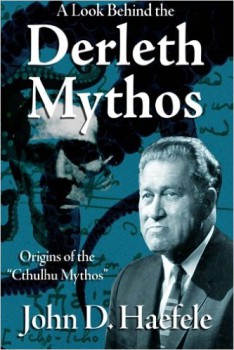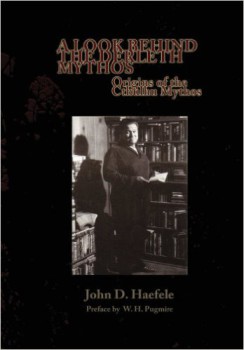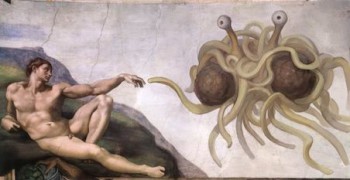Out of the Mouth of Madness
 I spent the past year in the frozen tundra on a quest not for gold or oil, but rather that elusive will o’ the wisp men call Ha of Saskatoon. I barely escaped with my life, a sad and broken man. Over the course of many months, I poured through John D. Haefele’s exhaustive tome, A Look Behind the Derleth Mythos which the redoubtable Don Herron bequeathed to me in an effort to restore my shattered mind. Having recently closed the book for the final time, I come forth with this my 250th article. A mere trifle for the more prolific blogger, but a milestone for this shadow of a man who once was.
I spent the past year in the frozen tundra on a quest not for gold or oil, but rather that elusive will o’ the wisp men call Ha of Saskatoon. I barely escaped with my life, a sad and broken man. Over the course of many months, I poured through John D. Haefele’s exhaustive tome, A Look Behind the Derleth Mythos which the redoubtable Don Herron bequeathed to me in an effort to restore my shattered mind. Having recently closed the book for the final time, I come forth with this my 250th article. A mere trifle for the more prolific blogger, but a milestone for this shadow of a man who once was.
Now in absolute fairness I should disclose a few facts before continuing. First off, I am not an H. P. Lovecraft cultist. I like aspects of the Mythos more than I do his actual fiction. This will be heretical to many, but I did not come upon his prose until later in life – long after Roy Thomas introduced me to his work in various comics he authored for Marvel in the 1970s and well after the time I had absorbed bits and pieces of the Mythos unknowingly while devouring Robert E. Howard’s stories in the pages of the Lancer or Ace Conan paperbacks with their stunning Frazetta cover art which, like that of Boris Vallejo and Neal Adams, frequently displayed brazen muscular buttocks in a fashion that touched something primal and possibly even impolite in my already warped adolescent brain.
I must also refrain from joshing my readers that a particular Lovecraftian scholar earned my enmity like no one since S. J. Perelman when I purchased a pricey, but beautifully bound and illustrated Sax Rohmer collection that was published in recent years only to find said literary critic’s introduction to the same was dismissive, condescending, and pompous in the extreme. It took much restraint not to craft an analogue for this bloated windbag in my third Fu Manchu book and allow the Devil Doctor to feed this bleating goat’s delicate parts to starving centipedes. Despite the appeal of such a notion, I chose instead to let karma find him and that it may have done with Haefele’s scholarly work.
 Now, some points should be made to further clarify my position on the book itself and the literary feud that too often overspills from its pages like some foul gelatinous being from that nameless abyss beyond the stars. First, the very existence of the so-called Lovecraft Circle comprised of writers and correspondents of the celebrated author from Providence made it abundantly clear that the Mythos was always first and foremost a literary game – a bit of fun for Lovecraft and his friends and acolytes to have laughing with and at the readers of Weird Tales good-naturedly.
Now, some points should be made to further clarify my position on the book itself and the literary feud that too often overspills from its pages like some foul gelatinous being from that nameless abyss beyond the stars. First, the very existence of the so-called Lovecraft Circle comprised of writers and correspondents of the celebrated author from Providence made it abundantly clear that the Mythos was always first and foremost a literary game – a bit of fun for Lovecraft and his friends and acolytes to have laughing with and at the readers of Weird Tales good-naturedly.
Second, that being said I remain firmly on the side of purists such as the much-quoted S. T. Joshi that only the original works are canonical. Pastiches and even licensed continuations are well and fine, but they are at best literary footnotes to the original creative works. So it is for those who can never have enough Sherlock Holmes, Fu Manchu, Tarzan, Doc Savage, or Mythos tales. We come forth to pay homage to the best of our abilities. We are not the original. We will never have the same impact. We offer tribute only and try to remain humble while doing so. Allegedly.
August Derleth was a name I first encountered when I attended grade school at St. Vlad the Impaler and read his book, Father Marquette and the Great Rivers. Soon thereafter I noticed his name on the cover of several Pinnacle paperbacks at the now-defunct Clark Avenue library on Cleveland’s West Side which introduced me to the curiously-named Solar Pons, a detective who strove to follow in the footsteps of the famous Baker Street original. I loved the Pons tales because of their humor and their sometimes excessive references to other literary works. It initiated me into the larger world of fantastic fiction where crossovers abound and led me on the path to discover Wold Newton. While I am not a cultist of any of these disciplines, their relevance as literary scholarship and sense of fun and camaraderie have brightened my years immeasurably. That sense only grows more precious as I descend further into madness and premature senility.
 Derleth loved H. P. Lovecraft’s works and singlehandedly set about preserving them through his Arkham House imprint. He took Lovecraft’s burgeoning Mythos and continued to shape it and mold it in His Own Image, but doing so helped ensure the original’s longevity. While I agree with the likes of Joshi that Lovecraft’s fiction, taken as a whole, represents the author’s worldview more accurately than any conjecture over which of the Master’s works qualify as Mythos fiction in the bleary eyes of his fanatical devotees, the very existence of such a thriving cult as The Church of the Flying Spaghetti Monster is proof that the humor and shared sense of community are part and parcel of Lovecraft’s enduring appeal to readers nearly a century on.
Derleth loved H. P. Lovecraft’s works and singlehandedly set about preserving them through his Arkham House imprint. He took Lovecraft’s burgeoning Mythos and continued to shape it and mold it in His Own Image, but doing so helped ensure the original’s longevity. While I agree with the likes of Joshi that Lovecraft’s fiction, taken as a whole, represents the author’s worldview more accurately than any conjecture over which of the Master’s works qualify as Mythos fiction in the bleary eyes of his fanatical devotees, the very existence of such a thriving cult as The Church of the Flying Spaghetti Monster is proof that the humor and shared sense of community are part and parcel of Lovecraft’s enduring appeal to readers nearly a century on.
Much is made of the fact that the Mythos tales by Derleth dilute the atheistic purity of Lovecraft’s cosmic indifferentism. This fact is never disputed by Haefele who takes the position that Derleth’s more simplistic good vs. evil stories broadened the appeal of the Mythos and brought Lovecraft to greater attention and eventual acclaim. It is worth noting that the humorless fanatical purist frothing at the mouth over Derleth’s apostasy is turning their cosmic indifferentism into an intolerant religion of their own and one whose elitism completely betrays the sense of communal fun that was integral to its source. In its own way, we are left with the literary equivalent of making war in the name of a God who espouses love and tolerance.
Of course, it is only one man’s opinion and not even a proper Lovecraft devotee’s opinion at that. To make matters worse, like Haefele who assembled his prodigious tome through literally years of well-documented research, I can make no claims of formal literary training having, as I do, a background in business only. That said, I am passionate about what I do and what I love even if I do sneer at the notion of airs among any pompous elitists concerning works of art that were never conceived as anything but escapism.
That said, I wasn’t joshing about the centipedes. I am on good terms with the Devil Doctor and may yet aid in avenging Sax Rohmer’s much maligned reputation.
Do yourself a favor and whether you’re a rabid Lovecraft or Mythos follower or only one who respectfully notes its influence on the fantastic fiction which followed and pick up a copy of A Look Behind the Derleth Mythos from The Cimmerian Press. The book is worthy of serious consideration for the sheer depth of research and the very positive and respectful fashion in which Haefele takes a controversial position among Lovecraft enthusiasts and makes as compelling and unbiased a case as possible from which to break from the deep-seated prejudices to reconsider the facts. Haefele’s decision to take the moral high road in a cold and indifferent literary universe restores one’s faith in ultimate goodness. Good on ya, Digger. You’re a better man than I, Gunga Din.
William Patrick Maynard was authorized to continue Sax Rohmer’s Fu Manchu thrillers beginning with The Terror of Fu Manchu (2009; Black Coat Press) and The Destiny of Fu Manchu (2012; Black Coat Press). His long-delayed third title, The Triumph of Fu Manchu is coming soon from Black Coat Press.
I know Ha of Saskatoon, both he and his wife are involved in SLLAG (Saskatoon Love Love Anime Group).
John, in Saskatoon
But… but… he nuked Cthulhu, man. He had his fan fiction characters drop an atom bomb on R’lyeh. Agh!
I’m afraid it is not the same entity, John in Saskatoon.
And Jeffro, what can I possibly add to that? You acquitted yourself eloquently.
[…] N (Black Gate) Out of the Mouth of Madness — “Derleth loved H. P. Lovecraft’s works and singlehandedly set about preserving them […]